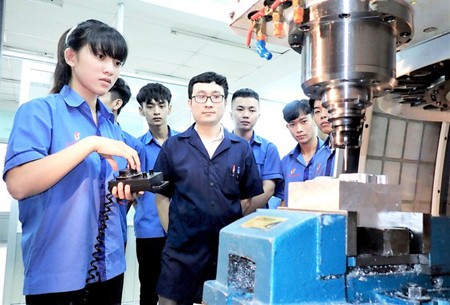
Thu Duc College of Technology, located in Thu Duc City of Ho Chi Minh City (HCMC), is now training over 10,000 students for a college degree in 24 majors and for a vocational diploma in 7 majors. This educational institute has recently applied online teaching and learning via its E-learning system, receiving many positive results.
However, feedbacks from students themselves reveal that this new learning method is not truly suitable for technical trainees since they need to obtain theoretical and practical knowledge simultaneously. Yet, online teaching can only provide theory, and the practice must be done via watching a video clip of teachers interacting with models. This might lead to uneasiness or insecurity.
Vice Principal of this college also admitted that 70 percent of the curricula here are practice sessions, which means grave challenges in implementing digital transformation. The most troublesome one lies in the unpreparedness of both the teaching staff, managers as well as learners. Adding to that is the need to truly interact with machines, not to merely watch a clip.
Sharing the same viewpoint, Ly Tu Trong College is now only applying E-learning for 46 theoretical subjects, but still finding it hard to do the same with practice lessons.
College of Technology II (under the Ministry of Labor, War Invalids, and Social Affairs), now training over 3,000 technical students, also said that there is much work to do in order to promote digital transformation among the teaching staff.
The final draft for the framework about digital transformation in vocational education clearly states that in 2030, all operations of these institutes and related state units, including management, teaching and learning, must be digitalized to reach the same level as other ASEAN-4 nations.
Particularly, 100 percent public services related to vocational education are considered level-4 ones and integrated into the National Public Service Portal. 30 percent of all vocational schools in the country must completely finish digital transformation, while 100 percent must introduce online education.
Deputy Director-General of the General Directorate of Vocational Training (under the Ministry of Labor, War Invalids, and Social Affairs) voiced that to fulfill the above goal, his organization must complete building a database for all schools, create a suitable platform for those schools, and introduce a suitable legal corridor as well as capable human resources. He added that these tasks must be closely linked to businesses.
Representative of the Ministry of Labor, War Invalids, and Social Affairs in HCMC Nguyen Hong Tay praised vocational schools in their application of IT to establish a ‘smart school’ model, and stated that it is essential to connect vocational training to businesses so that training can answer the demands of the labor market.
General Director of Sao Mai Equipment Solution Corp. Dao Ngoc Hoang Giang suggested that the ‘smart school’ model should begin with forming a smart library to serve both teaching, learning, and researching needs. With an effective smart library, educational activities can be held more flexibly as teachers feel more convenient to share learning materials with their students.






















